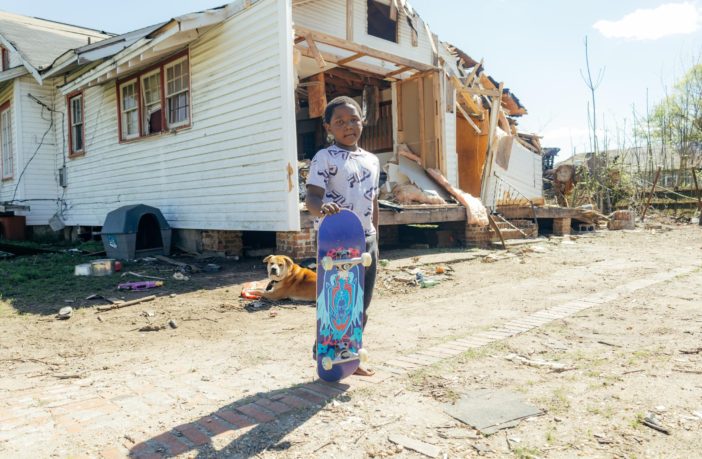This week marks the 58th Anniversary of “Bloody Sunday” the Selma to Montgomery march and the subsequent passage of the 1965 Voting Rights Act. The events of March 7, 1965 effectively fueled the Civil Rights Movement and changed our nation. Selma was a major milestone in the fight for voting rights, so It’s fitting that Black Voters Matter, one of the nation’s leading voting rights organizations, was on the ground to commemorate this historic occasion.
As the nation descended on Selma for the annual march across the Edmond Pettus Bridge, we decided to take pause and venture past the historical sites, parade route, and festivities to dig deeper into the stories of Selma. The people and culture make Selma great – we wanted to find ways to increase support for the hardest hit communities after the devastating tornado that tore through the city on January 12th.
While on the ground in Selma, Black Voters Matter co-founder Cliff Albright issued a national call to action to help rebuild the historic city of Selma. BVM is urging individuals, organizations, and corporations to support the ongoing local recovery efforts by donating to the following organizations that are doing ongoing relief work and outreach in the city of Selma.
Coalition of Concerned Families, The Black Belt Community Foundation, and the Selma Center for Nonviolence, Truth, and Reconciliation.
As we surveyed the city, it was evident that the extent of the damage was devastating to homeowners and business owners alike. We sat down with some long-time residents who wanted to share their stories.
Renada is a Selma native and organizer with the Coalition of Concerned Families who worked to provide resources and aid to the victims immediately following the storm.
During our interview, she reflected saying, “On January 12th our city was ravaged, but we hit the ground running to provide immediate assistance and housing because we knew there were so many families that had lost their homes.”
The Coalition of Concerned Families booked all the available hotel rooms in Selma and the surrounding cities. They partnered with Foot Soldiers Park to secure disaster rates on hotel rooms outside the city.
She went on to say, “Black Voters Matter was the first call we received from outside of Selma and they told us, ‘Don’t worry, immediate help is on the way.’ We housed as many people as possible until the funding ran out.”
James was born and raised in Selma and has been in his home since 1963. His home was severely damaged by the tornado that completely ripped off the back side of his house leaving a gaping hole that exposed the interior rooms.
His family is trying to rebuild but says it’s difficult with few resources. During our interview, James shared that he and his family had to evacuate the area because the city was scheduled to demolish the houses in his neighborhood that were beyond repair at 3 pm that afternoon.
He only had a few hours to retrieve his belongings.
When asked how the tornado affected his daily life he said, “Wow, I guess all I can say is we are upside down – this is not something that you could get used to. This is my first time being directly impacted by a tornado, and it’s been devastating.”
He noted that the immediate need of the community was housing for those displaced. His message to the president and other elected officials was simply to “see about the people and find out what’s actually going on in Selma.”
Leola was displaced from the home that she rents. Leola’s home had extensive damage to the roof, broken windows, and the carport was completely torn from the house. While she was able to stay with family while repairs were being made to her home, she noted that it was difficult maintaining residency in two places because she is still paying rent and utilities in a home that is uninhabitable.
Selma will forever be recorded in the history books as ground zero of the Civil Rights Movement, but what the books don’t tell us is that Selma had a history of wealth and promise for Black people prior to the decades-long fight for voting rights. Selma was self-sufficient and had a thriving economy because the local air force base employed sixty percent of its residents.
Craig Air Force Base closed in 1977 after what many believe to be a divestment of resources by the federal government in retaliation to the national attention brought on by the Selma to Montgomery march. The residents of Selma sacrificed greatly for the cause of freedom. They were stripped of their livelihood and have struggled for decades to revive the flailing economy.
Today, Selma is one of the poorest cities in Alabama. And the aftermath of the tornadoes has made it even harder for residents to repair their property and rebuild their lives.
A combination of strategies is necessary to help Selma rebuild and thrive again. Among those strategies is disaster relief to rebuild homes and businesses destroyed by the storm, financial investment into the local economy, and the passage of Voting Rights legislation that protects the people from voter suppression and intimidation tactics that prevent fair and equal elections.
Black Voters Matter has not forgotten about Selma. We are committed to preserving its history and working to improve the lives of the generations of Alabamians who still live there today.
Article written by Nomsa Hampton for Black Voters Matter



